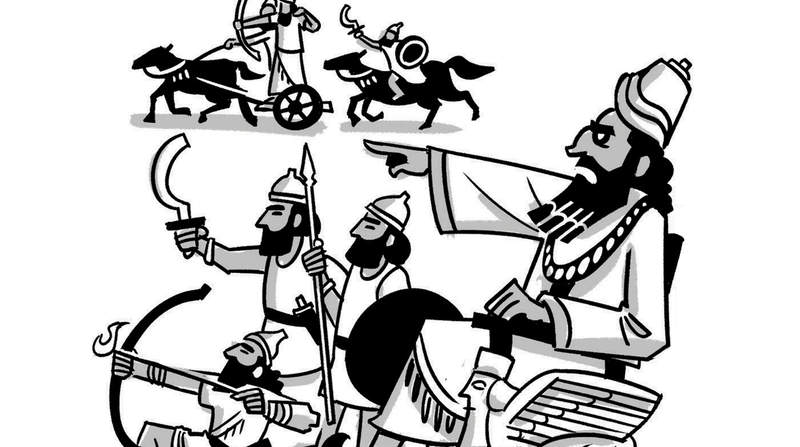The Book of Jeremiah
About

Jeremiah was an Israelite priest who lived and worked in Jerusalem during the final decades of the kingdom of southern Judah. He was called as a prophet to warn Israel of the severe consequences of breaking their covenant with God through idolatry and injustice. He predicted that the empire of Babylon would come to destroy Jerusalem and carry them into exile. And sadly, his words became reality. He lived through the siege and destruction of the city and witnessed the exile take place (2 Kgs. 24-25).
This book came into existence in a really interesting way. Chapter 36 tells us that after 20 years of preaching in Jerusalem, Jeremiah sensed God prompting him to collect all his sermons, poems, and essays and commit them to writing. He did just that by employing a scribe named Baruch, who wrote down and compiled all the material into a scroll. Baruch also gathered lots of stories about Jeremiah and linked all the pieces together. This is why the book reads like an anthology, or a collection of collections that have all been arranged to present this prophet as a messenger of God’s justice and grace.
Jeremiah 1-25: Accusations and Warnings of Judgment
The book of Jeremiah begins with God calling Jeremiah to be a prophet and giving him a dual vocation. He was to be a prophet to Israel and the nations, and his words would “uproot and tear down,” and also “plant and build up” (Jer. 1:10). In other words, Jeremiah was to accuse Israel and warn them of God’s coming judgment, but he was to also give a message of hope for the future. This introduction perfectly summarizes the first large section, chapters 1-24, consisting of a collection of Jeremiah’s writings from before the exile.
The core idea here is that Israel has broken their covenant with God and violated all the terms of the agreement in a number of ways. They’ve adopted the worship of all kinds of Canaanite gods and built idol shrines all over the land. Jeremiah uses a metaphor of idolatry as adultery, and he uses the language of prostitution, promiscuity, and unfaithfulness to describe how Israel has given their allegiance to other gods. Jeremiah also repeatedly accuses Israel’s corrupt leaders. Their priests, kings, and prophets have all abandoned the Torah and the covenant, leading to the tragic consequence of rampant social injustice. The most vulnerable in their communities, the widows, orphans, and immigrants, are being taken advantage of in clear violation of the laws of the Torah, and Israel’s leaders don’t even care.
A classic place where all these themes come together is in chapter 7, called Jeremiah’s temple sermon. Israelites are coming to worship their God in the Jerusalem temple as if everything is fine. Outside the temple, however, they are worshiping other gods, even adopting the horrifying Canaanite practice of child sacrifice. So Jeremiah makes this very unpopular announcement—the God of Israel is coming in judgment to destroy his own temple and punish Israel by sending an “enemy from the north.” This is an army that God would allow to conquer Jerusalem, known as the great empire of Babylon.
This leads up to the turning point in chapter 25. Israel has still not turned back to their God, so in the first year of Babylon’s new king, Nebuchadnezzar, God tells Jeremiah to announce that their armies were coming to conquer and take Israel into exile for 70 years. He compares Babylon to a cup of wine, filled with God’s righteous anger at all Israel’s injustice and idolatry, and he says that he will make Israel and the surrounding nations drink from that cup. This chapter is the key to the book’s design, as everything that follows will focus on Babylon’s coming attacks, first on Israel (chs. 26-45) and then on the other nations (chs. 46-51).
Jeremiah 26-45: Stories of Disaster and a Message of Hope
The section about Israel begins with stories about Jeremiah calling the people to repent (chs. 26-29). He warned them right up to the last minute, despite the constant rejection of Israel’s leaders. This section concludes with stories about Jerusalem’s siege and eventual destruction, as well as stories of how Jeremiah was persecuted and later kidnapped and taken against his will to Egypt with a group of Israelite rebels (chs. 34-45).

Now, right here in between these dark stories of disaster and judgment is a collection of Jeremiah’s messages of hope for Israel’s future (chs. 30-33). He picks up on Moses’ prediction that Israel would break the covenant with their God and go into exile. But Moses also promised that God would not abandon his people; he would renew his covenant with them and transform their hearts (Deut. 30).
Jeremiah develops Moses’ words further by saying that God would one day inscribe the laws of the Torah not on tablets but on the hearts of his people (Jer. 31:33). God would heal their rebellious hearts, so that they are able to truly love and follow him. In that day, Israel will return to their land, the Messiah from the line of David will come, and all nations will recognize the true God. These chapters show that, despite Israel’s apostasy, God will not let their sin get the last word. His own faithfulness will bring about the fulfillment of his promises—no matter what.
Jeremiah 46-52: Judgment for Babylon and Exile
Next, we find another large collection of poems that describe how God will use Babylon to judge the nations around Israel: Egypt (ch. 46), Philistia (ch. 47), Moab (ch. 48), Edom, Ammon, Damascus, and Hazor (ch. 49). Then, surprisingly, the longest poems near the end of the book are about God’s coming judgment on Babylon itself (chs. 50-51). Although God used this nation to execute his justice, he does not endorse their violence and idolatry. Babylon, too, is judged under the standard of God’s justice, so Jeremiah denounces its pride and injustice as well.

Babylon is larger than life in these poems, reminding us of the image of the city and tower of Babylon all the way back in Genesis 11. In these poems, the character of Babylon has become an archetype of all the rebellious nations. In their glorification of wealth and war, God will give the Babylonians over to their own destruction.
The book concludes with a story taken from the very end of 2 Kings 25 and tells the story of Babylon’s final attack on Jerusalem. The soldiers destroyed the city walls, burned the temple, and took many of the people into exile. The story shows how Jeremiah’s warnings of judgment from chapters 1-24 were in fact fulfilled, and Jeremiah was vindicated as a true prophet.
But that’s not how the book ends. The conclusion tells a short story about the captive Israelite king, Jehoiachin, from the line of David. After some decades of imprisonment, the king of Babylon releases him, shows him favor, and invites him to eat at the royal table for the rest of his life, and that’s the last paragraph.
This relatively grim book is designed to end with a small glimmer of hope that recalls Jeremiah’s prophecies of hope. God has not abandoned his people or the promise of a future king from David’s line. And so the book of Jeremiah gives its readers a sober evaluation of Israel’s past along with a hopeful glance into their future.

